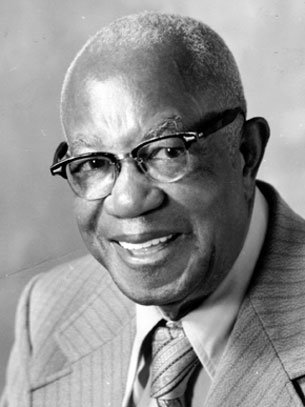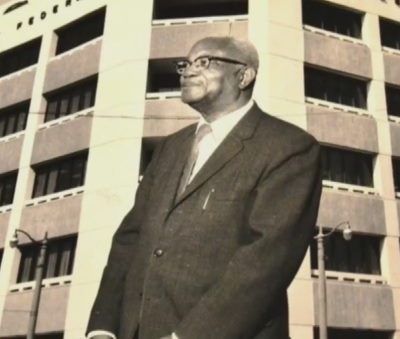 A lot of good people do a lot of good things for their communities. We refer to them as pillars of society or backbones of the community. On the rarest of occasions, a person comes along who fits these descriptions and more. Their entrepreneurial vision and benevolent goodwill combine to make them an iconic beacon of hope to a people who very much need one. Dr. A. G. Gaston was that kind of person, and the Alabama Broadcasters Association is honored to posthumously induct him into the ABA’s Hall of Fame.
A lot of good people do a lot of good things for their communities. We refer to them as pillars of society or backbones of the community. On the rarest of occasions, a person comes along who fits these descriptions and more. Their entrepreneurial vision and benevolent goodwill combine to make them an iconic beacon of hope to a people who very much need one. Dr. A. G. Gaston was that kind of person, and the Alabama Broadcasters Association is honored to posthumously induct him into the ABA’s Hall of Fame.
“One of my goals in life, one of my passions is to create more awareness of who he was and what he’s done,” says Rochelle Gaston Malone about her grandfather. “Something like this induction and this honor … this information about him being brought to the forefront … is going to help this process of awareness.”
Gaston was born in a log cabin in Demopolis, AL, in 1892. He moved to Birmingham with his mother while he was still a young boy, eventually working at Tennessee Coal and Iron Company. While there, he recognized a need in the black community for funeral homes, and so he started a funeral business. This started an entrepreneurial chain reaction.
He saw how his neighbors were unable to secure loans, so he opened his own savings and loan. To equip people with the skills they needed to work in his businesses, Gaston created a business college. During the civil rights era, he opened a motel so those who participated in the movement – including Dr. Martin Luther King – had a nice place to stay.
 Gaston also wanted to give African Americans a source for news and entertainment so he purchased WENN-AM and WAGG-AM/FM . “That was the main goal of owning the station,” says Malone. “He wanted to create an outlet or vehicle of information where things could be reported from the African American viewpoint – all the information that was instrumental in the well being of the African-American community and people.”
Gaston also wanted to give African Americans a source for news and entertainment so he purchased WENN-AM and WAGG-AM/FM . “That was the main goal of owning the station,” says Malone. “He wanted to create an outlet or vehicle of information where things could be reported from the African American viewpoint – all the information that was instrumental in the well being of the African-American community and people.”
As was the case with some of his other businesses, Gaston found a way to educate young people in the skills they would need to work in radio. He opened the A.G. Gaston Boys and Girls Club in 1967 and set up a studio within the facility that included microphones, turntables, and a board … everything you need to broadcast a radio program. The “station” was only heard from speakers located throughout the organization, but it was a great way for kids to get a taste of what it was like to work in radio.
Chris Coleman, vice president of programming at WATV-FM, was one of those kids who acted as a DJ from that Boys and Girls Club studio. “I always wanted to be a DJ, so I would bring up music every Saturday. My dad would drop me off at the boys club and I would be there all day”, smiles Coleman. “It’s where you got to be a DJ and you’d talk to the people and make the announcements. It’s like you were a DJ at a real radio station.”
Gaston also created a WENN high school advisory board and Coleman was lucky enough to be chosen as one of the advisors. “We’d meet at the radio station in the conference room. Now DJs were like stars at that time. It was big,” laughs Colman. “You went to school with a WENN advisor jacket on and you were the most popular kid!”
Malone believes that her grandfather’s work was the fulfillment of a spiritual calling.
“When I think of him I reflect on Ecclesiastes 3: 1-8. Everything is for a time and a season,” she says. “I believe my grandfather was anointed and appointed by God for this season of his life”.
“Dr. Gaston lived to 104,” says Coleman. “I think he lived a long life because of the great work he did in this community. He set people up to make money, and if he set you up, you couldn’t fail!”
Carol Jenkins, Gaston’s niece, wrote a book about her uncle titled Black Titan. Perhaps this passage best illustrates the magnitude of his legacy: “He created a world for us where we had an up close look at limitless possibilities. We simply never thought, ‘a black person can’t do that’ because our uncle had. “